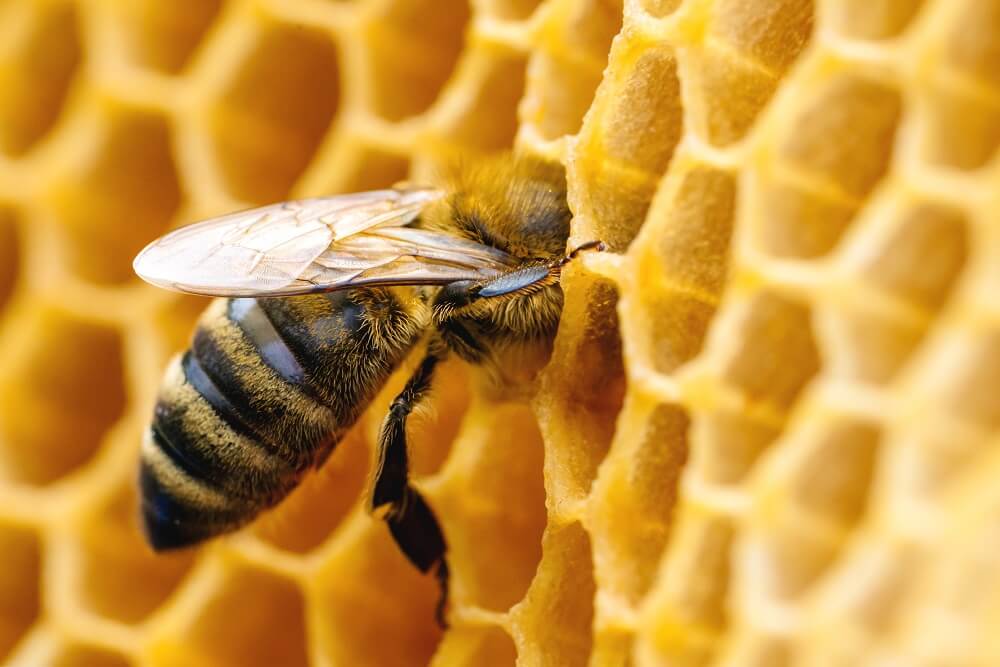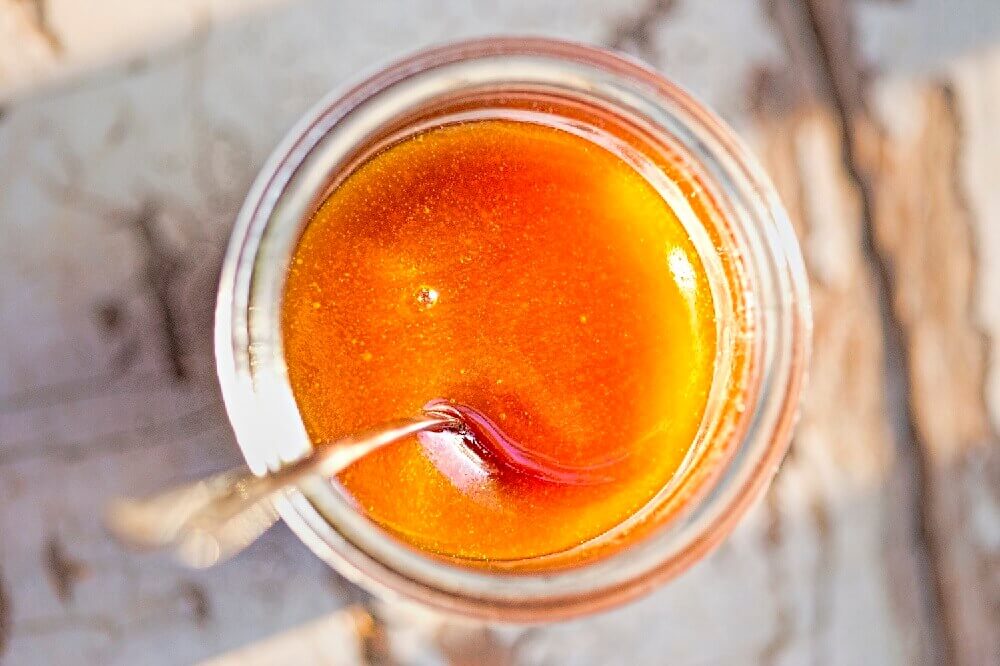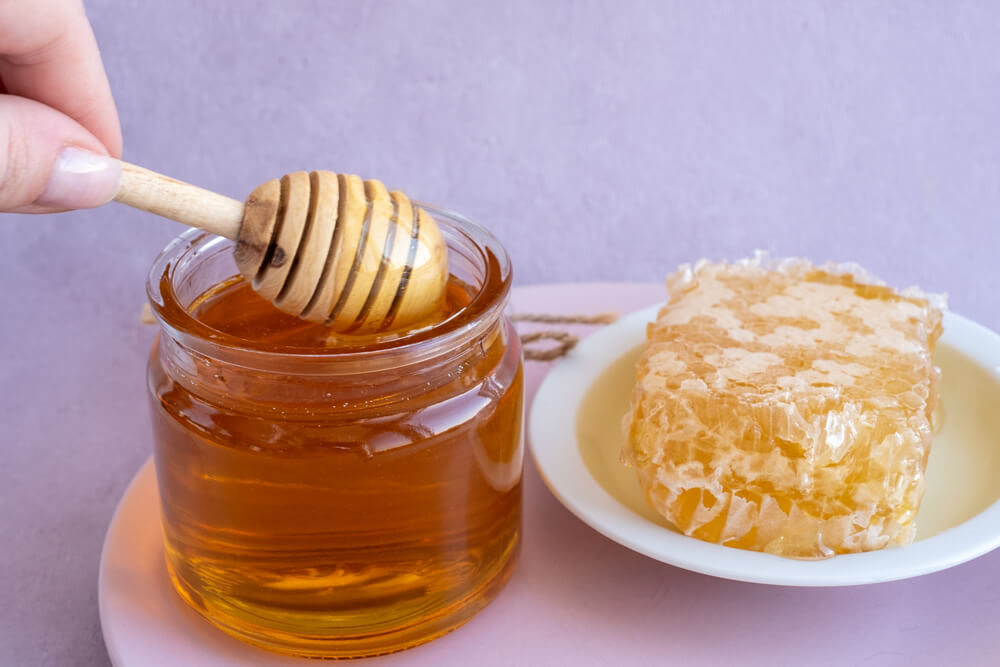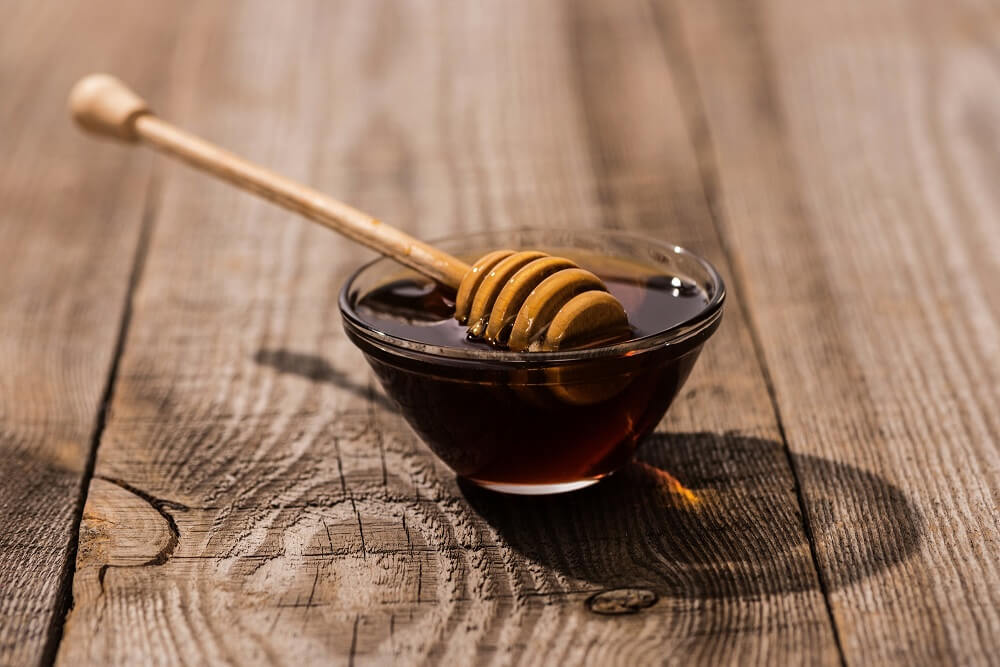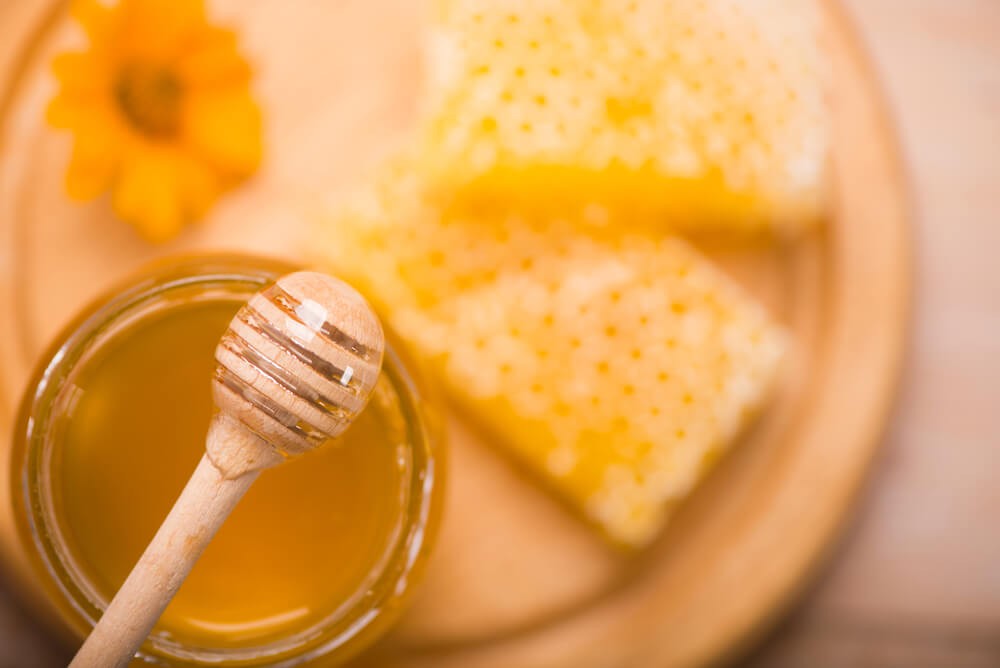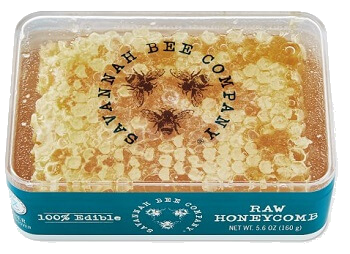Table of Contents:
Can You Eat Honeycombs?
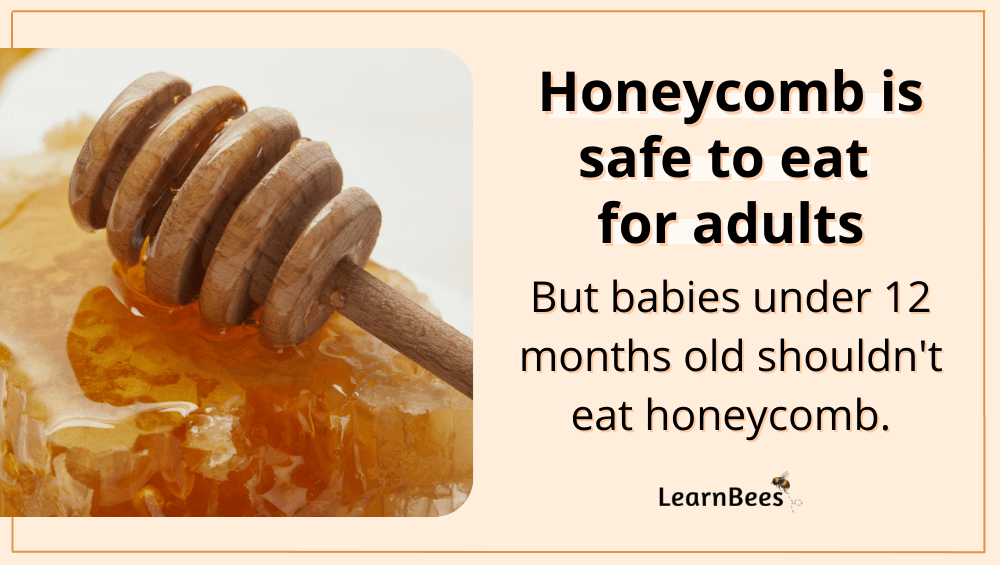
To put it simply:
Yes, you can eat the entire honeycomb. Honeycomb is made of beeswax, which acts as a container for honey. According to the USDA, eating beeswax is generally considered safe.(1)
Even better?
Honeycomb is more delicious than you might think.
Check out this honeycomb tasting video from EmmyMade:
The honeycomb Emmy samples comes from Savannah Bee Company. It’s filled with pure acacia honey, which tastes better and more natural compared to what you get from the grocery store. The honey melts in your mouth with the perfect amount of sweetness.
It’s delicious.
But I should issue a warning:
Babies under 12 months old should not eat honey or honeycomb. Although it’s very rare, honey can contain spores that lead to infant botulism. Infant botulism can cause muscle weakness, a weak cry, and trouble breathing.(2, 3)
Once your child is older than 12 months old, they can enjoy honeycombs.
Our Honeycomb Pick: Savannah Bee Company
How to Eat Honeycombs
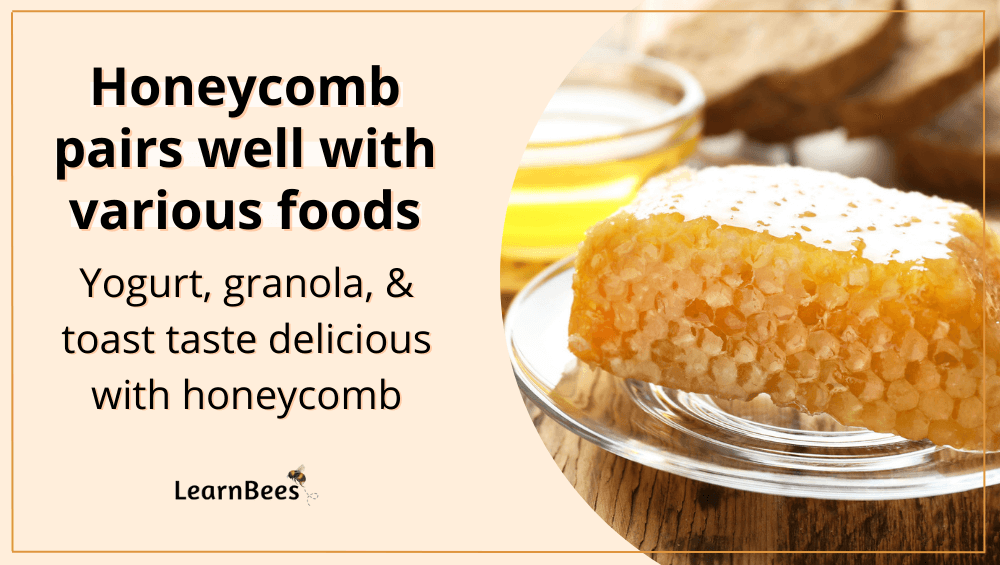
The secret’s out. You can eat honeycombs in more ways than you’d imagine.
That’s why there’s no precise answer to the question, “What’s the best way to eat honeycombs?” But, here are a few delicious foods to pair your honeycombs with:
- Yogurt
- Oatmeal
- Cereal
- Ice cream
- Coffee
- Tea
- English muffins
- Bread
- Toast
- Bagels
- Pancakes
- Waffles
- Fruit
- Salads
- Cheese and crackers
- Chocolate
Personally, sometimes I’ll pair my honeycomb with yogurt. Sometimes I’ll put it on toast.
But my favorite way to eat it?
Straight on its own.
You can bite directly into the comb and enjoy the delicious flavor from many different types of honey. Then, you can chew the honeycomb as gum, swallow it, or spit it out.
Our Honeycomb Pick: Savannah Bee Company
7 Incredible Benefits of Eating Honeycombs
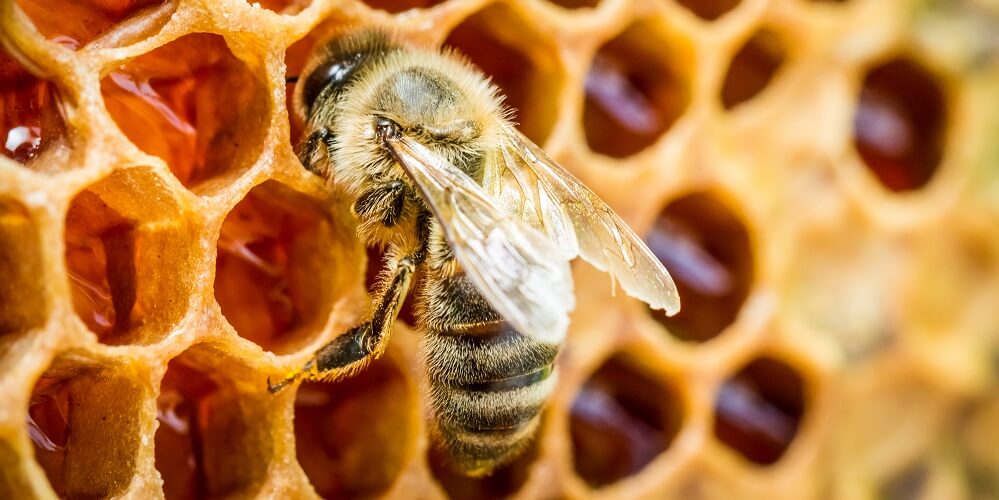
Benefit 1: Eating Honeycombs Can Protect You Against Certain Infections
Here’s something that might surprise you:
Eating honey can potentially boost your body’s ability to fight certain fungi and bacteria. For example, some test-tube studies found that beeswax extract might offer protection from E. coli, Staphylococcus aureus, Candida albicans, and Salmonella enterica.(4)
Eating honeycomb and honey is also popular for its antimicrobial benefits. For example, a clinical research article said this about the antimicrobial benefits of honey:
“Honey has a potential therapeutic role in the treatment of disease by phytochemical, anti-inflammatory, antimicrobial, and antioxidant properties… Based on these facts, the use of honey in clinical wards is highly recommended.”(5)(6)
Also, research shows that eating honey can help protect your gut against Giardia lamblia, an intestinal parasite.(7)
Benefit 2: You Get Nutrients From Eating Honeycombs
Now get this:
Raw honey is chock-full of antioxidants like phenolic acids and flavonoids. According to the Mayo Clinic, antioxidants can protect your cells against disease-causing free radicals. (8, 9, 10)
Why is this important?
Because antioxidants play a crucial role in your health. Research suggests they might protect against heart disease, diabetes, and cancer. Some studies also found that eating certain types of honey – like buckwheat honey – may increase antioxidants in your blood.(11, 12, 13)
Benefit 3: Eating Honeycomb Can Sooth Children’s Coughing
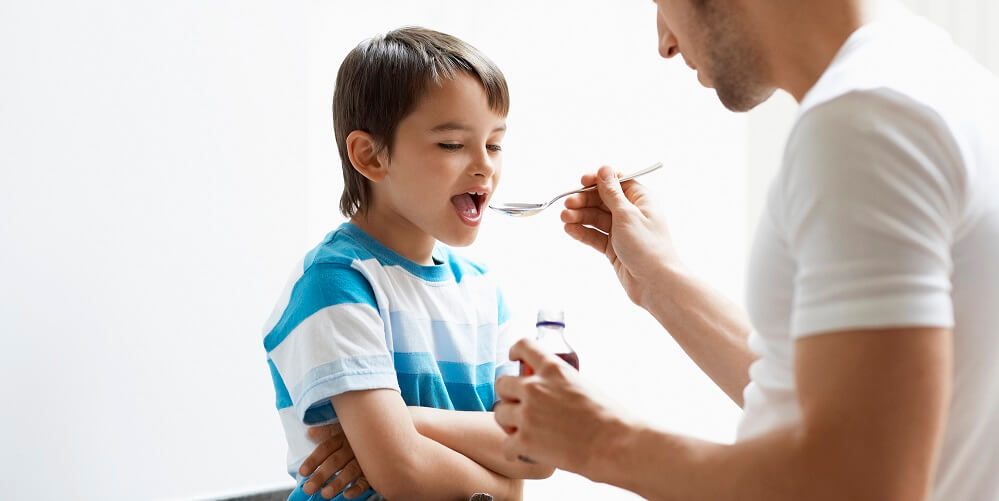
Let’s face it. Children can be hard to handle when they’re sick.
Plus, many kids are reluctant to drink cough syrup because they dislike the taste. This is where eating honeycombs comes in. One study of more than 300 children found that honey was more effective than cough syrup.(14)
Here’s what the doctor reported:
“Parents of 300 children 1 to 5 years old with URI reported that cough frequency, cough severity, bothersome nature of cough, and child and parent sleep quality improved after treatment in the groups that received honey.”
Another study of more than 100 children found similar results.(15)
But keep in mind:
Don’t give honey to babies under 12 months old. It can contain spores that can lead to infant botulism. Infant botulism can cause your baby to have trouble breathing, muscle weakness, and a weak cry.(16)
Benefit 4: Eating Honeycombs Can Promote Heart Health
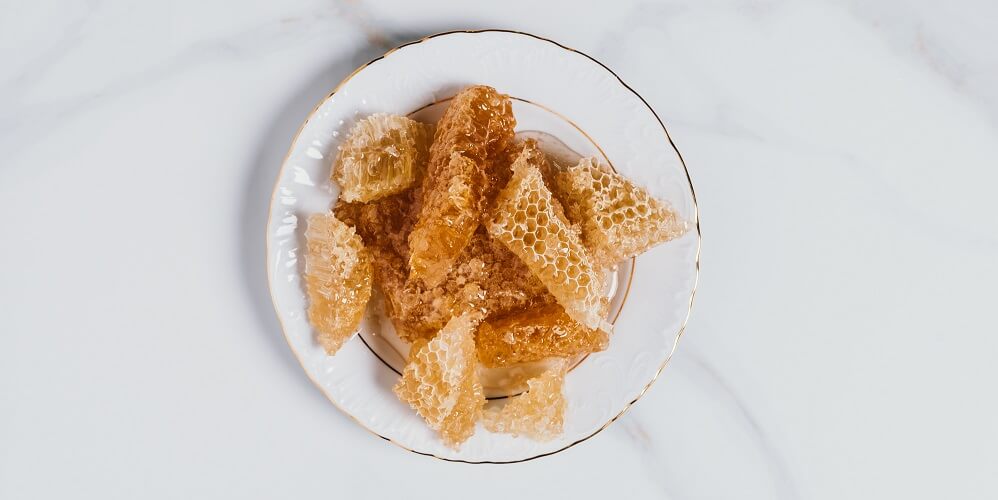
Now here’s the deal:
When you’re asking, “Can you eat honeycombs?” you’re really asking if you can eat beeswax. Why? Because honeycombs are made of beeswax.
And the good news is that beeswax contains long-chain fatty acids and alcohols, which may lower high blood cholesterol levels. High blood cholesterol levels are a risk factor for heart disease.(17)
One study even found that replacing sugar with honey might also decrease triglyceride levels by up to 19%.(18)
But the heart health benefits of eating honeycombs don’t stop there. The antioxidants found in honey may help dilate the arteries leading to your heart. In turn, this could increase blood flow and lower blood pressure. As a result, honey could potentially lower your risk of blood clots, heart attack, and stroke.(19)
Benefit 5: Eating Honeycomb is a Potential Sugar Alternative for Diabetics
Surprise, surprise:
Honey is sweeter than sugar, so smaller amounts are needed to get the same level of sweetness. For example, wildflower honey offers a delicious and light flavor that pairs perfectly with coffee, tea, or breakfast foods.
And the upside to it?
An 8-week clinical trial found that honey doesn’t appear to raise blood sugar levels as much as refined sugar.(20)
But this is crucial:
Honey will still elevate blood sugar levels, so people with diabetes should eat honeycombs in moderation. That said, more and more research is showing that honey can be a good addition to a diabetic diet. But as with anything, moderation is key.(21)
Benefit 6: Your Liver Function May Improve By Eating Honeycombs
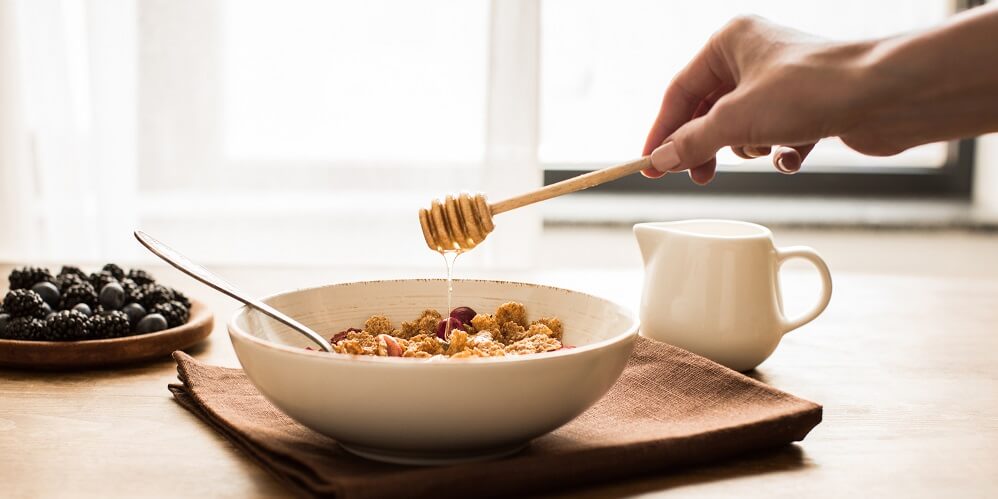
Just when you thought eating honeycombs couldn’t get any better…
It does.
A six-month study gave beeswax alcohols daily to people with liver disease. 48% of these people said their symptoms decreased. They reported less abdominal pain, nausea, and bloating.(22)
But more surprisingly?
28% of those participants exhibited a normal liver echo pattern on ultrasonography after the completion of the study.(23)
Benefit 7: You Can Help Treat Diarrhea By Eating Honeycombs
150 children with acute gastroenteritis were given honey with an oral rehydration solution in a clinical trial.(24)
The results?
These children reported better recovery from diarrhea than the children who didn’t receive honey.
The doctors reported this:
“Generally, with regard to the findings of this study, prescription of honey for diarrhea can reduce the number of bowel movements and diarrhea period.”(25)
FAQs about Eating Honeycombs
- How do I buy honeycombs?
- Why do people eat honeycombs?
- What does honeycomb taste like?
- How long does honeycomb stay good for?
- Can you freeze honeycomb?
- Can you eat honeycombs if you’re vegan?
- How much honeycomb is safe to eat?
- Can you eat honeycomb while pregnant or breastfeeding?
- Can babies eat honeycomb?
- Can you eat honeycombs with braces?
- Can you eat honeycombs if you’re allergic to bees or pollen?
- Can you eat honeycombs straight from the hive?
- Can you eat honeycombs on keto?
- Is raw honey safe for the elderly?
- Can you eat honeycomb wax?
How do I buy honeycombs?
You can buy honeycombs near the honey section in your local grocery store. If your local store is out of honeycombs, then you can purchase honeycombs directly here.
—> Go back to the FAQs on “Can You Eat Honeycombs?”
More to Explore:
Why do people eat honeycombs?
People eat honeycomb because of its unique and rich flavor. It’s a million times better than regular store-bought honey. Once you try it, you’ll never go back. And you know what else? Raw honeycombs often contain small amounts of royal jelly which gives them a slightly sweet, slightly acidic taste. This gives even more flavor than just eating plain honey from an ordinary jar or squeezable plastic bottle.
—> Go back to the FAQs on “Can You Eat Honeycombs?”
What does honeycomb taste like?
Honeycomb tastes like the flowers that the bees pollinated. For example, a honeycomb that tastes like blueberry came from bees who visited blueberry plants. Honey also ranges in color. It can be dark honey, light honey, or anything in between. You can get honeycombs in a variety of different honey flavors, including from:
Now you might be asking: How does raw honey differ from commercial (processed honey)?
Raw honey tastes different from commercial honey because it hasn’t been heated and filtered. This means it tastes more natural and still contains all of its enzymes and antioxidants.
Additionally, because the wax combs have bee pollen and propolis, the taste is slightly different from store-bought honey. This is why people who don’t like the taste of store-bought honey love raw honeycomb — it tastes pure and has the right level of sweetness.
—> Go back to the FAQs on “Can You Eat Honeycombs?”
More to Explore:
How long does honeycomb stay good for?
When stored properly, honey and honeycombs never expire.
How come?
Because honey is made up of about 80% sugar, which can inhibit many types of bacteria and fungi. It also has a low moisture content which stops bacteria from surviving. This means you can pass a bottle of honey down to your great-grandkids and beyond.
So remember: The best way to store your honey is to keep it in an airtight container where no moisture can creep in.
—> Go back to the FAQs on “Can You Eat Honeycombs?”
More to Explore:
Can you freeze honeycomb?
Yes, you can freeze honeycomb. But, freezing your honeycomb will cause it to crystallize and become solid.
Don’t worry, crystallized honey is still perfectly good. You can learn how to decrystallize honey here.
hat said, most people find the best way to keep raw honeycomb is at room temperature in your pantry or on your counter. You can seal your honeycomb in an airtight freezer container or wrap it tightly in plastic wrap. If you freeze your honeycomb, allow it to come to room temperature before unwrapping.
—> Go back to the FAQs on “Can You Eat Honeycombs?”
More to Explore:
- Honey for Skin Benefits: Directions, Uses, & Risks
- Allergic to Honey: Signs of a Honey Allergy + Treatment
- Can You Eat Beeswax?
Can you eat honeycombs if you’re vegan?
Honey is an animal-derived food, so by definition, it’s not considered vegan. Animal-derived foods aren’t included in a vegan diet because they can contain traces of animal DNA.
Bees create the honey themselves with nectar from plants, so honey comes into contact with them during the collection and processing routines. That’s why most vegans exclude honey and honeycomb from their diets. Instead, vegans replace honey with natural plant-based sweeteners like agave nectar and maple syrup.
—> Go back to the FAQs on “Can You Eat Honeycombs?”
More to Explore:
How much honeycomb is safe to eat?
As with anything, moderation is key. Small amounts of honeycomb are safe to eat. Since honeycomb is high in sugar, you don’t want to overdo it by gorging on honey.
But pairing honeycomb with your toast, yogurt, coffee, or other foods is considered safe. With that said, babies under 12 months old should avoid eating honeycombs (or honey) because it can contain spores that lead to infant botulism.(29, 30)
—> Go back to the FAQs on “Can You Eat Honeycombs?”
More to Explore:
Can you eat honeycombs while pregnant or breastfeeding?
Two of the most common questions we get are:
“Can you eat honeycomb when pregnant?” and “Can you eat honeycomb while breastfeeding?”
The answer to both of those questions is yes.
“Children over age 1 and healthy adults—including pregnant women—can safely consume honey because their immune systems protect against any bacteria the honey might contain,” says Sandy Procter, PhD, a professor of nutrition at Kansas State University.
—> Go back to the FAQs on “Can You Eat Honeycombs?”
More to Explore:
Can babies eat honeycomb?
Babies under 12 months old cannot eat honeycomb. Honey can contain toxins that can potentially harm your developing baby. It’s rare, but there have been documented cases of spores in honey leading to infant botulism. Infant botulism can cause muscle weakness, a weak cry, and trouble breathing.(33, 34)
—> Go back to the FAQs on “Can You Eat Honeycombs?”
More to Explore:
- Acacia Honey: The Taste, Health Benefits, & Risks
- Why is Manuka Honey So Expensive?
- What Are Honeycombs Make Of?
Can you eat honeycombs with braces?
Eating honeycomb with wire braces isn’t recommended. Because of the honeycomb’s chewy and sticky texture, it can get trapped in your brackets and cause problems. But as always, it’s best to check with your orthodontist.
—> Go back to the FAQs on “Can You Eat Honeycombs?”
More to Explore:
Can you eat honeycombs if you’re allergic to bees or pollen?
If you’re allergic to bees or pollen, it’s not recommended to eat honey or honeycomb. Remember that bees can’t remove all the pollen before making the honeycomb, so some will likely be present in small amounts. The National Honey Board says that “the amount of pollen in honey is minuscule.” But you still want to be careful if you’re allergic.(35)
—> Go back to the FAQs on “Can You Eat Honeycombs?”
More to Explore:
- The Brutally Honest Truth About Sour Honey
- Buckwheat Honey: Uses & Benefits
- How to Make Creamed Honey
Can you eat honeycombs straight from the hive?
“Can you eat honeycomb right out of the hive?” is one of the most common questions beekeepers get. The answer is yes, you can eat honeycomb right from the hive. However, if you’re going to harvest honey, it’s recommended to have your protective gear ready and an experienced beekeeper to help.
—> Go back to the FAQs on “Can You Eat Honeycombs?”‘
More to Explore:
Can you eat honeycombs on keto?
Honeycombs aren’t considered keto-friendly because they’re high in carbs. One tablespoon of raw honey has 17 grams of carbs. So eating large amounts of honeycomb can prevent you from entering ketosis. That said, eating one tablespoon of honey probably won’t hinder your results.
—> Go back to the FAQs on “Can You Eat Honeycombs?”
More to Explore:
Is honeycomb edible and safe for the elderly?
Honey is generally safe for adults and children older than 12 months old. But if you have diabetes, you may want to eat honey in moderation due to its high sugar content.
—> Go back to the FAQs on “Can You Eat Honeycombs?”
More to Explore:
Can you eat honeycomb wax?
Honeycombs are made of beeswax. And yes, you can eat the wax as long as you’re not under 12 months old. Babies under one year should avoid eating honeycombs or honey because it can contain harmful bacteria that lead to infant botulism. Infant botulism can cause muscle weakness, a weak cry, and trouble breathing.(36, 37)
